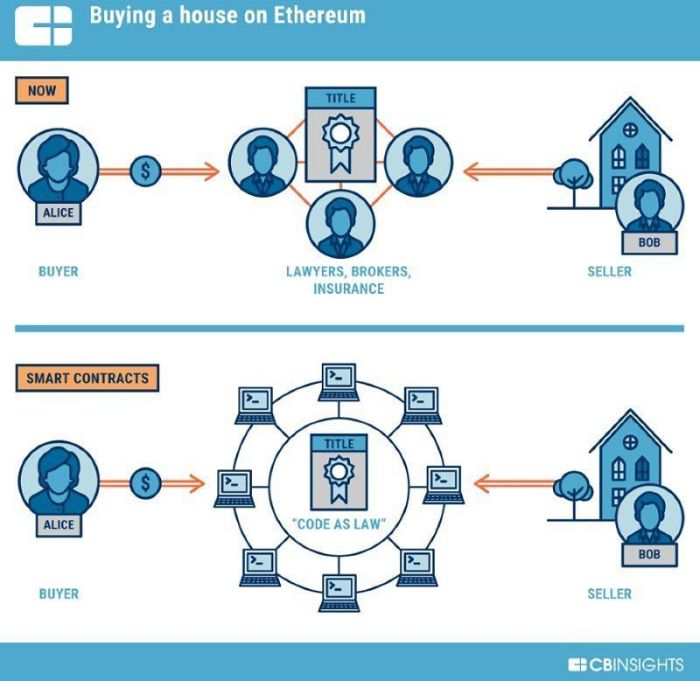Ethereum smart contracts are changing the game in blockchain technology, offering a seamless and automated way to execute agreements. These self-executing contracts on the Ethereum platform are transforming industries and streamlining processes without the need for intermediaries. Get ready to dive into the world of Ethereum smart contracts!
Introduction to Ethereum Smart Contracts

Ethereum smart contracts are self-executing contracts with the terms of the agreement directly written into code. These contracts operate on the Ethereum blockchain platform, allowing for secure and trustless transactions without the need for intermediaries.
Role in the Blockchain Ecosystem
Smart contracts play a crucial role in automating processes and reducing the reliance on intermediaries. By executing predefined actions when specific conditions are met, smart contracts ensure transparency, efficiency, and accuracy in various transactions.
Ethereum Smart Contracts Development
Creating an Ethereum smart contract involves several key steps, from writing the code to deploying it on the blockchain. Let’s dive into the process of developing smart contracts on the Ethereum network.
Programming Languages for Smart Contracts
When it comes to developing smart contracts on the Ethereum network, the most commonly used programming language is Solidity. Solidity is specifically designed for writing smart contracts and is the go-to choice for Ethereum developers due to its similarity to JavaScript. Other languages that can be used include Vyper, Serpent, and LLL.
Deploying and Interacting with Smart Contracts
To deploy a smart contract on the Ethereum blockchain, you first need to compile the contract code into bytecode using a Solidity compiler. Once compiled, you can deploy the contract using a tool like Remix or Truffle. Interacting with smart contracts involves sending transactions to the contract address, which can trigger the execution of functions within the contract. This interaction is done through a web3 provider like MetaMask or directly through a decentralized application (dApp).
Use Cases of Ethereum Smart Contracts

Ethereum smart contracts are being utilized across various industries to streamline processes, enhance security, and increase transparency. Let’s explore some real-world examples where Ethereum smart contracts are revolutionizing different sectors:
Finance
In the financial sector, Ethereum smart contracts are being used for automated loan issuance, decentralized lending platforms, and decentralized exchanges. These smart contracts enable secure and transparent transactions, eliminating the need for intermediaries and reducing processing times.
Supply Chain
Smart contracts on the Ethereum blockchain are transforming supply chain management by providing real-time tracking of goods, verifying authenticity, and automating payments upon delivery. This ensures greater efficiency, reduces fraud, and enhances trust among stakeholders in the supply chain.
Healthcare
In the healthcare industry, Ethereum smart contracts are being leveraged for securely storing and sharing patient data, facilitating efficient insurance claims processing, and ensuring compliance with regulations. These smart contracts improve data security, streamline operations, and enhance patient privacy.
Real Estate
Smart contracts are revolutionizing the real estate sector by enabling transparent property transactions, automating rental agreements, and facilitating tokenization of real estate assets. Ethereum smart contracts eliminate the need for costly intermediaries, reduce paperwork, and ensure faster property transfers.
Digital Identity
Ethereum smart contracts are also being used for digital identity management, allowing individuals to control their personal information securely. These smart contracts enable self-sovereign identity solutions, protect against identity theft, and enhance data privacy for users.
Ethereum Smart Contracts vs. Traditional Contracts
When comparing Ethereum smart contracts to traditional legal contracts, it’s important to understand the key differences and implications of each.
Advantages of Ethereum Smart Contracts
- Automated Execution: Smart contracts are self-executing, eliminating the need for intermediaries.
- Transparency: Transactions on the blockchain are transparent and immutable, reducing the risk of fraud.
- Efficiency: Smart contracts can streamline processes and reduce the time and cost associated with traditional contracts.
- Security: The decentralized nature of blockchain technology enhances security and reduces the risk of manipulation.
Disadvantages of Traditional Contracts
- Manual Processes: Traditional contracts require manual intervention and can be time-consuming.
- Lack of Transparency: Paper-based agreements may lack transparency, making it harder to track changes or disputes.
- High Costs: Traditional contracts often involve high costs related to legal fees and other administrative expenses.
- Risk of Fraud: Paper contracts are susceptible to fraud and tampering, leading to potential legal disputes.
Impact on Legal and Business Transactions, Ethereum smart contracts
- Efficiency and Cost-Effectiveness: Smart contracts have the potential to revolutionize legal and business transactions by automating processes and reducing costs.
- Increased Security: The immutable nature of blockchain technology enhances security and reduces the risk of fraud and manipulation.
- Disruption of Intermediaries: Smart contracts could disrupt traditional intermediaries, such as banks and legal services, by providing direct peer-to-peer transactions.
- Global Adoption: As smart contracts become more widely adopted, they could facilitate cross-border transactions and international trade.